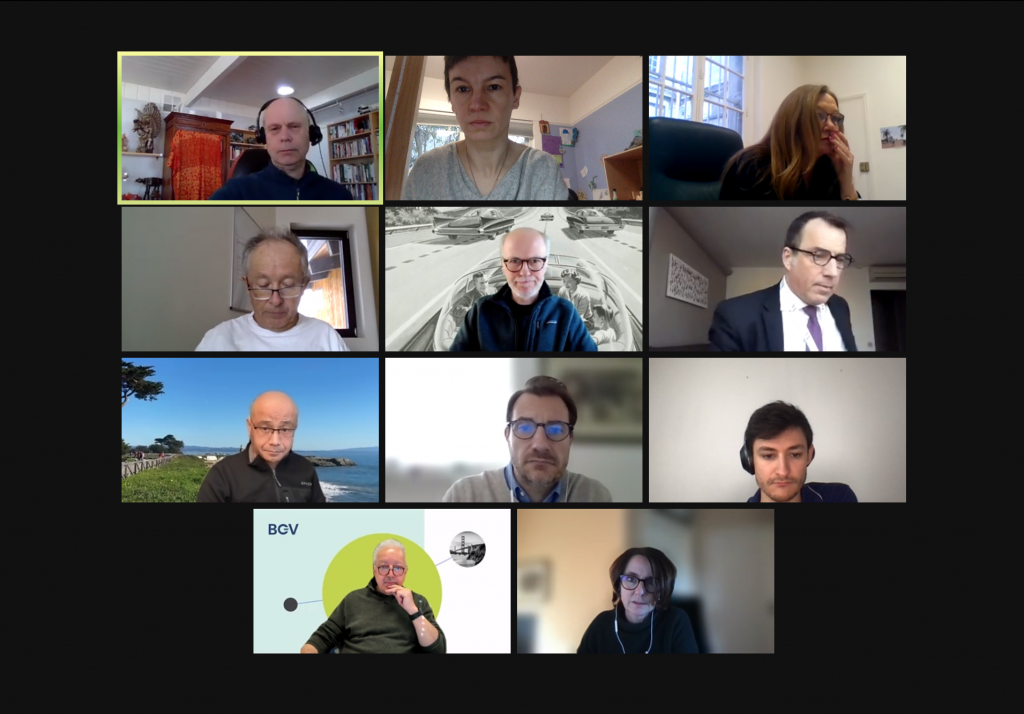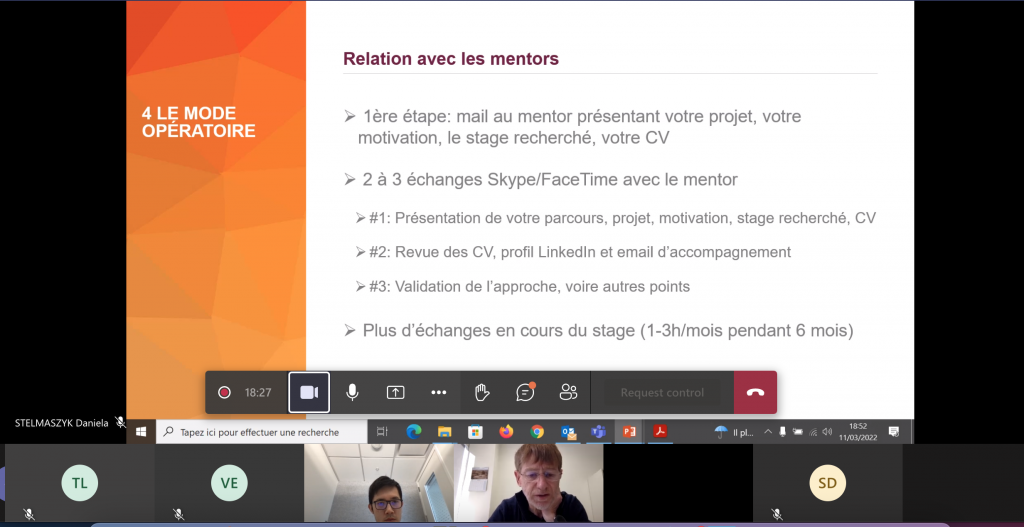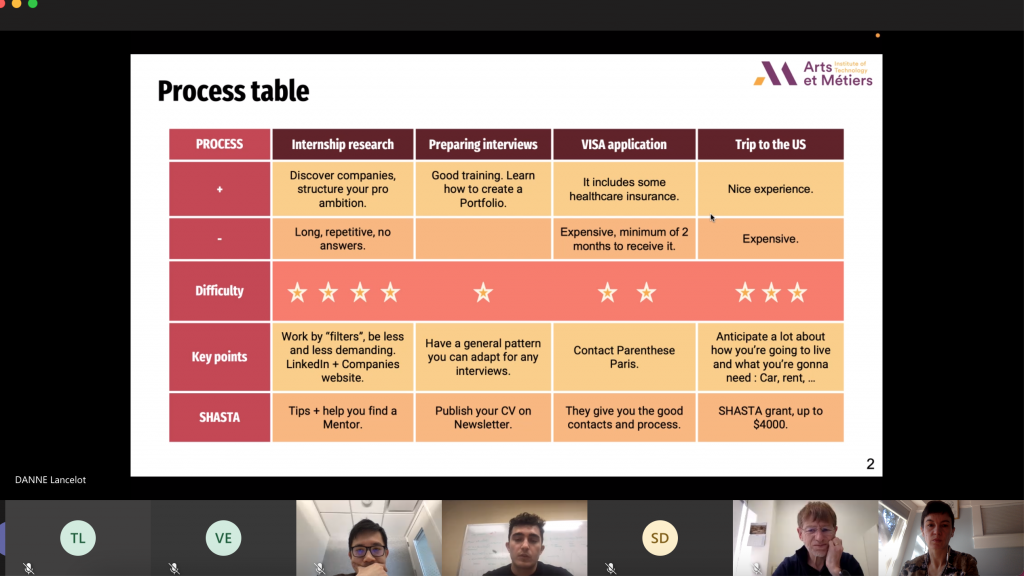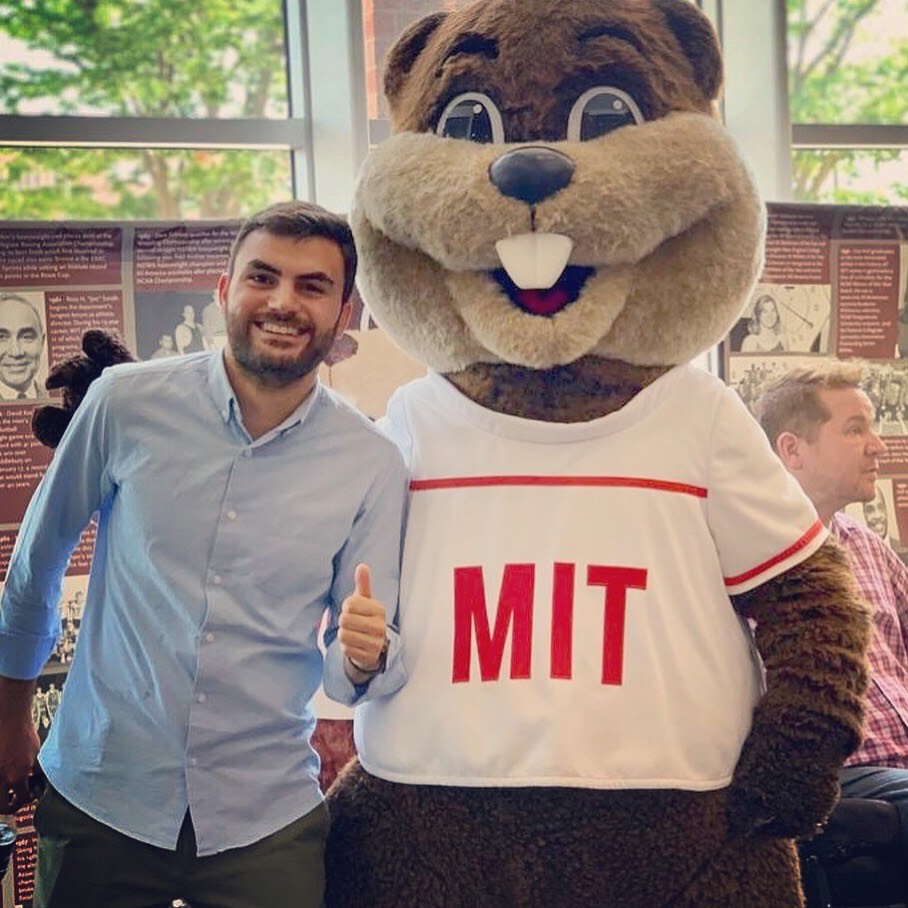- Details
Every year we have dozens of students in the Shasta program. Some of them just contact us once to get a consultation, some - stay for 6 or more months, find mentors, manage to find internships.
We asked students about their Shasta experience, collected their testimonials and would like to share some of them here with you:
"I would like to thank my mentor for coaching me. His valuable experience of American practices and knowledge of the difference with the French job market allowed me to be more prepared for the interviews I had";
***
"I really appreciated working with my mentor. During several months, she helped me build a strong profile that met American job market standards. She also gave me essential tips and insights of what it is to work in the US as an intern. All along the program, I really felt supported and encouraged, and I will always be grateful for the time she took to help me achieve my goal";
***
"The Mentor was a support and a source of experience that I needed to succeed in finding my internship in the United States. A big thank to my mentor Marc!"
***
I heard about Shasta after a conference made in Paris broadcasted live in the SOCE website. This introduction to the Shasta program motivated me immediately! First contacts with Albina confirmed my motivations and my expectations.
Albina mentored and coached me great to adapt my resume “the American way”. Then we work on my executive summary, essential to catch the recruiter attention. When I get my first interview proposal, Albina gave me some advice and asked me if I needed a mock interview… I also was in contact with my mentor who helped me find good start-ups or companies which could hire me.
***
I am very grateful for all the support that I received from the AFAM for my internship in Georgia. Its implication helped me to better plan my stay in the US and made it perfect! Thank you!
All Arts et Metiers students can join our Shasta program at any time
AFAM is also looking for Shasta mentors, referrers and experts. Please contact us if you think you can help
- Details
On March 7th AFAM board meeting took place. Laurent Champaney, who recently renewed his mandate as President of Arts et Metiers school, participated in this meeting to share his vision of the future of the school.
His project for Arts et Metiers includes several goals:
1) Develop Arts et Metiers identity (around “evolutive learning factories”)
2) Develop environmental and social responsibility
- environmental responsibility: Campus A&M 2030
- Social responsibility: men-women, personal development
- Engagements 2022: Grenoble engagement, auto evaluation label DDRS
3) Train more ( formation continue, formation tout au long de la vie): 3000 alumni/year (+50%), more professors-researchers, more foreign students, more students from business schools, more partnerships, more research activities/exchanges)
4) Better support (international development and entrepreneurship)
International project:
in Europe: German-French Institute for Industry of the future(KIT)
in Africa: campus Morocco
in Asia - Singapore, Malaysia
in the USA - partnership with Texas A&M and ESI
Besides, all board members could hear other reports (CFO, community manager, AFAM committees and regional groups, SOCE and Arts et Metiers Foundation) and discuss current and future activities of AFAM together.
While AFAM board meetings are not open to the public, you can always contact us to share your questions and suggestions

At the board meeting: (from left to right) Xavier Wartelle (Li 82), CEO of AFAM; Albina Patou-Chebykina, community manager; Audrey Stewart, Arts et Metiers International Director; Jean-Luc Nauleau (An 81), board member; Marc Amblard (Cl 84), AFAM CFO; Laurent Champaney, Arts et Metiers president; Yarith Phay (Bo 91), AFAM Secretary; Patrice Brossard (Bo 95), AFAM board member and DG Amériques; Louis Renaux (Cl 216), AFAM board member; Eric Benhamou (Ai 72), AFAM President Emeritus and AFAM board member; Valerie Prulhière (Li 87), VP International, SOCE and other board members during the meeting
- Details
On March 11th, AFAM participated in International Week organized by Arts et Metiers.
International Week attracts students who are interested in studying or working abroad. It is a very successful and useful event as speakers can share their experience of international mobility with Arts et Metiers students. AFAM has participated in this event for several years.
This year one of our Shasta students - Lancelot Danne (Li 219) - who is currently working as intern for a Californian company - shared his experience of searching and finding his current internship in the US. Besides, AFAM community manager Albina presented AFAM activities as well as Shasta and Yosemite programs. Our alumni Nicolas Horde and Jean Pommier, both members of the Shasta commitee, could also join this meeting to introduce themselves to the students and reply to their questions.
AFAM was happy to see all the students and will be glad to invite them to our future events. Our next online event is scheduled for April 8th. To know more about visas, please sign up to be able to participate in our next event.
To know more about International Week
To know more about Shasta program
To know more about Yosemite program

AFAM presentation on the screen during the meeting

Lancelot Danne presenting his experience of a Shasta student
- Details
AFAM: Hello Antoine and thank you for sharing your experience of being a student at MIT. Please tell us a few words about yourself!
Antoine: I did my first year at the Châlons campus and the second in Paris. From an extracurricular point of view, I took part in several projects - some of which I initiated. For example, a presentation competition in English called "Present Around the World" organized by the IET (Institution of Engineering and Technology). I won the competition within the school and then nationally. This allowed me to represent France in Kazakhstan. It was really cool!
Then, I worked with IET in France and on the campus of Châlons by creating a group in which I organized events. For example, I invited 4 companies to present "business cases", which the students had to answer during one day. In the second year, I followed the US pathway, which allows students to do a third year in the USA and in which Arts et Métiers helps us to apply to major American universities.
I am now working in Switzerland at the Swatch Group as an IT Project Manager. Trying to implement customer centric digital solutions that make the customer journey an always better experience for the clients of the Swatch Group brands.
TAKE MY WORD FOR IT:
Getting ready university applications (for parcours US students)
Important things not to miss:
- Be ready for parcours US selection: prepare your voeux 1A, know what you want (what specialization and American universities you’re interested in);
- Study well (your national and 1A ranking will be considered for the selection);
- If you can, obtain an internship after your first year at school, if you can – get it in the US. If you can’t or did not, try to find an internship/summer project to work on to enrich your skills and experiences.
Questions to Antoine:
AFAM: What was the most challenging for you while getting ready for your application? What supporting document for your application required more effort and attention?
Antoine: As mentioned in the introduction ( first question), I was involved in many different projects. This added to all the applications, and "normal" school was a real challenge in terms of workload. I wanted to succeed in all three. I believe the key was really organizing myself and relying on good documentation to be as efficient as possible. Clear objective, documentation and then work. For example, GRE scores are very important when applying to American universities. The objective was thus to get the best score possible. To achieve that, I bought the official GRE prep book from the official company. That way, I knew the questions I prepared on will be very similar to the questions I would get on D-day. Combining these "optimal documents" with a lot of work allowed me to get a great score !
I would also recommend all the documentation made available by alumni (based on their experience). They include incredible tips on how to prepare SoP and are real gold mines ! Use them!
AFAM: How many university applications are feasible to prepare and send without being completely overwhelmed?
Antoine: I believe it all depends on the "eagerness" and time of each one of us. There are some things that you can prepare for once, for all universities (GRE for example) - that's ok. But, there are other things that you must prepare for each university (SoP). So yes, be careful not to apply to too many masters, or the overall quality of your SoP might be impacted ! I recommend the 222 rule. 2 dream schools, 2 doable schools, and 2 safety schools -that's what worked for me. But again it depends on the will and time of each person.
AFAM: Looking back, what do you think you would do differently regarding your applications?
Antoine: Spend even more time on my SoP to make them even more specific. Show specific strengths for different applications. This would have increased my desirability even more. Spend time on those SoP!
TAKE MY WORD FOR IT:
Congrats! You are in!
Starting mid-March you will be receiving answers from Universities. Once you are admitted to an American University, you’ll need to think about your future trip.
Things to think about:
- Make a to-do list. Get all your confirmations (medical file, tuition fees payment, graduate writing exam, English language test, your passport, your visa, where will you live on campus)
- Explore all possible options to finance your studies. There are plenty of them!
- Start thinking about your future internship in the US!
Questions to Antoine:
AFAM: What was your very first strong impression when you first arrived on MIT campus?
Antoine: WOAW, I am surrounded by the best people in the world ! (for real)
If the courses are obviously of very good quality, they have however - in my opinion - nothing to envy to what one can find in the big French universities. This is not the main strength of MIT. The main strength of MIT is its environment and its reputation. To be a student at MIT is to be at the heart of innovation, in the heart of a technological hub that is Cambridge and where everything is REALLY fast. I didn't believe it until I got there, but everything at MIT is really fast-paced, there's always a great, cutting-edge project on the go. On top of that, the speakers coming to teach at MIT are CEOs of huge companies. Two examples are: the founder of Netflix who came to give us a lecture and the founder of the satellite launcher OneWeb who came to give us a lecture. On top of that, you can add Venture Capitalists and others who also come to lecture.
AFAM: Do you think you missed some things at MIT you could have been able to enjoy?
Antoine: Well, I was at MIT when Covid started. So I believe I could have enjoyed more events. Really, this school always has something happening ! It's so dynamic !
AFAM: What was your favorite spot on MIT campus?
Antoine: The Martin Trust Center for MIT Entrepreneurship. This is the entrepreneurship center - a great place where you feel good and people work on their startup idea ! A place where creativity is everywhere. I spent hours there. For me, this place is the essence of MIT and every time I went there, I would have the same feelings as what's described just above !
TAKE MY WORD FOR IT:
You are in the US! Yeeeee!
MIT classes start around September 5-6th in general with a few days of Orientation in August. Some activities are organized by a Graduate Student Council. You can find the planning on MIT website.
Fall term
You will have some mandatory classes to take:
2.810 Manufacturing Processes and Systems
2.854 Introduction to Manufacturing Systems
2.961 Management for Engineers
You have one additional class to choose from:
2.675 Micro/Nano Engineering Laboratory
2.821J Selection and Processing of Structural Materials
15.871 Introduction to System Dynamics + 15.872 System Dynamics II
2.120 Introduction to Robotics (only for those who signed a waiver for 2.810)
2.171 Analysis and Design of Digital Control Systems (only for those who signed a waiver for 2.810)
2.740 Bio-inspired Robotics (only for those who signed a waiver 2.810)
You can also take classes as a listener without getting credit.
January - is a Independent Activities Period (IAP) month
For more information please read: http://web.mit.edu/iap/
Spring term
You will have some mandatory classes to take:
2.830 Control of Manufacturing Processes
IDS.735 Supply Chain Planning & IDS.736[J] Manufacturing System and Supply Chain Design
2.739 Product Design and Development
2.S998 New Process Development - "Bench to Money”
Industry Project - Thesis
Summer term
Mid-May - Mid-August - you will work full time in the company. You will also prepare your thesis.
Questions to Antoine:
AFAM: What were your favorite classes?
Antoine: 2.961 (Management for Engineers) & 2.739 (Product Design and Development) because they made me think differently. Why manufacture any product if your company has no strategy, no value proposition and no clients ? Take a step backwards, exit your "specialty" and try to see the whole value chain. Eye-opening.
AFAM: What were the most challenging/difficult classes/ activities/practical elements for you?
Antoine: In the US they have a huge culture of data. Everything is based on data, facts. I used to follow my guts but that does not work that easily at MIT. I had to adapt, not easy, but very interesting. I now understand why all actions must be based on data solely. Get out of your habitual way of doing things !
AFAM: Looking back to your MIT academic experience, what would you do differently and why?
Antoine: A year at MIT goes by very quickly and at the end of the year you realize that you want to stay a little longer. It was definitely an exceptional and unique experience both from a professional and personal point of view. This year in Boston has been a very enriching experience that has helped me discover new horizons and perspectives. I believe that it will stay with me forever not only because it taught me to think and act differently, but also because I was able to form strong bonds with fellow students from all over the world. Because of all that she taught me, I would not change anything - by fear of not having learned it all. If you go to MIT, you MUST fully dive into it.
Photo (courtesy of Antoine): Antoine on MIT campus
To get the full Louis Magne report of Antoine Yazbeck and know more about his MIT journey, please contact AFAM community manager
- Details
Basma Aiouche ( Cl 214) is an Arts et Metiers and MIT alumna.
Here is her Monday Advice #4 to A&M students (enrolled in "parcours US" program):
When you have your embassy appointment to obtain your F1 student visa ( or J1 if you are going to pursue an internship in the US) , do not take any electronic device bigger than your phone. You will not be able to enter the embassy with other electonic devices but your cell phone.
Basma Aiouche full Louis Magne report (you need to sign up first): https://americanfriendsam.org/shasta-internship/shasta-2-0-for-students/student-reports.html
Resources for parcours US students:
https://drive.google.com/drive/folders/0B8M77gmEUbv0S1FNOVZ6OGsyQ28


 BLOG /
BLOG /  CALENDAR /
CALENDAR /  DONATIONS /
DONATIONS /  MENTORS /
MENTORS /